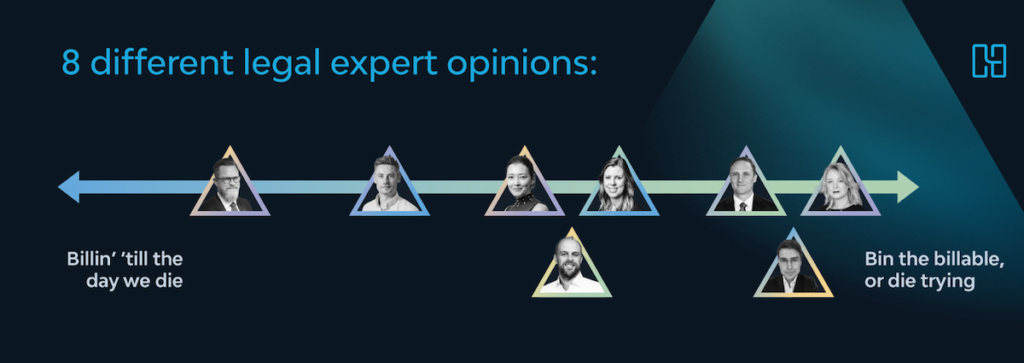
By Henchman.
Are you still billing by the hour? The reality is that most lawyers are and plenty will still be using it in the year 2032. However, many legal experts agree: the billable hour is under pressure, forcing lawyers to investigate other billing methods as well.
Laura Rosseel, Senior Associate at Cambrian, explains clearly why the billable hour is a topic for discussion: ‘There are countless arguments against working with billable hours. Invoicing based on billable hours puts the risk of both unpredictability in the scope of work as well as potential inefficiency on the client, instead of the law firm that is providing the service.
‘It does not differentiate based on the value of the task at hand, the urgency, or the time of day (or night), with which the task is carried out. Additionally, it is a performance metric for lawyers that favours working more over working better, and the relentless pressure is causing junior and mid-level lawyers to leave their firms.’
And if the discussion wasn’t complex enough already, adding technology to the mix might be the icing on the cake. Legal work changes under the influence of legal tech. The main gain: redundant work is taken care of by software. But why would you want to become more efficient if you are ultimately rewarded by the amount of hours you put into your work?
Or, as Jana Blount, Change Maker at DLA Piper, says: ‘It requires a fundamental change in the way the legal industry places value on its work.’
So as a sector, we need to explore options to reward efficiency, because technology is making its way into the legal world – no matter what. If your firm doesn’t start innovating today, you might eventually become obsolete.
In all aspects of their daily life, people are becoming used to the benefits of using tech and they expect the same from their lawyers. And on top of that, for clients, the billable hour feels uncomfortable and sometimes like writing a blank cheque. They don’t necessarily want it dirt cheap, they want predictability and budget forecasting.
However, how to move away from this way of working is not always apparent – as proved by the many firms who are still using it: billing by the hour ensures no surprises for the lawyers in case the scope changes.
This made us wonder: are there hybrid possibilities? And do we leave it up to the client to choose what kind of pricing they prefer – by the hour, hybrid or value-based?
We’ve asked eight legal experts where they stand. And, interestingly enough, we got just as many different opinions. We hope these different points of view can serve as an inspiration, and maybe even challenge you to rethink the way your firm is billing. Discover them for yourself in this free, downloadable white paper.

- Jana Blount – Change Maker at DLA Piper
- William Woodford – Founder at Avantech Law
- Richard Tromans -Founder of Artificial Lawyer & Tromans Consulting
- Laura Rosseel -Senior Associate at Cambrian
- David Turney – Co-Founder and Managing Partner at Avery Law
- Steven Ongenaet – Head of Service Delivery at NEXL
- Eve Vlemincx – Attorney & Strategic Business Partner
- Tobias Heining – BDMC Director Osborne Clarke Germany, ELTA Board Member.
Download the full report here

[ Artificial Lawyer is proud to bring you this sponsored article by Henchman. ]
I’m looking forward to reading this report! I’ve staked my legal career on ditching the billable hour, hence my firm name: Subscription Attorney LLC.